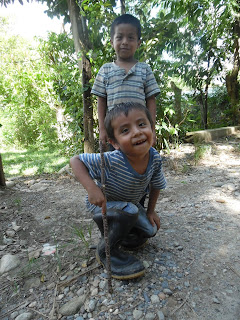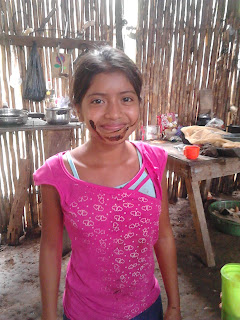personally will remember it as the toughest
and most challenging month of my stay in Nueva Mercedes ever since I came here in April.
Contrary to all expectations and weather
forecasts based on previous years, it rained for three weeks non-stop. Apart
from the obvious and banal consequences on our general mood and our enthusiasm
for going outside, the intensity and duration of this “tropical depression”
(caused by a hurricane coming to us from the north, somewhere in Mexico, it
seems!) had quite some impact on our daily activities with the community of the
village.
First of all, it clearly reduced overall
attendance rates of the younger participants, especially in the mornings. If we
were ready to climb out of bed and bravely march down to school despite the
monsoon outside, it seems that the kids were not as eager to poke their little
faces through the classroom door on those days. And who can really blame them?
It's always funny to see those who do come laugh at us and our “rainproof
armour” of waterproof trousers, raincoats and Wellington boots… Whereas they
come dressed in their usual short-sleeved clothes and sometimes barefoot,
trudging through the mud without blinking an eye.
Secondly, it is more than likely that the
heavy downpours sabotaged the women's efforts to grow the first seeds that we
planted in their home gardens only a few days before the rains began, as part
of the Hortalizas project. It is not a tragedy in itself, but it brings about a
general disappointment for us and for them, when every single woman
participating in the project reported no results whatsoever. Not even a single
sprout! “No salió nada” they tell us in Q'eqchi' when they don't know the words
in Spanish. Only one of the 15 participants has seen the nascent beetroot plant
peak out of the ground before the monsoon came and destroyed it but washing the
earth away. Lesson to be learnt: the rainy season is perhaps not the best time
to launch the vegetable garden project… Although, with the dry season having
unbearably long periods of heat waves without so much as a drop of rain, it is
always a challenge to find the right balance here.
The word of mouth is such a strong vector
of communication in this tiny village, that the repercussion of projects
results here often resembles a house of cards: one woman, unsatisfied with the
results of the home garden, tells her neighbour that planting radish, cucumber
and parsley was a waste of time. Whatever reason or explanation she may give
for it, what sticks in the mind of the community was that this project was a
failure. And it won't be long before the rest of the participants and potential
participants will be demoralised too… That's the greatest harm of all these
unfortunate events: an unlucky coincidence which does not depend on us, the
volunteers, could easily topple all of the Lichutam's efforts and convince the
participants that it's not worth trying again.
Last but not least, let's talk about the
power cuts. We already mentioned it in the previous post, but since then it got
much, much worse. Power failures due to heavy rainfall are neither infrequent
nor abnormal here, and November has not spared us our rightful share. However,
in the last week of November electricity cuts became a daily matter of course.
And when I say “daily”, I really mean it.
As if by law of curfew, all lights in the house go out at exactly 6PM every
night, since 10 days. Sometimes, electricity comes back in a couple of house.
And others, unluckily, the power cut lasts the entire night and is returned to
us between 5AM and 9AM the following morning, I spare you the obvious
explanation of the impact this has on our capacity to do anything at home
(apart from eating dinner and going to bed) after sunset.
The real problem is that these disturbances
has been a heavy blow on our computer literacy classes with the men of the
village. The 6PM-7:30PM computer lessons, scheduled at the only time that was
doable for the participants (all full-time employees working on the
plantation), have simply been interrupted by untimely power cuts of simply
cancelled since the routine power cuts began for a total of 3 weeks in a row.
Despite the knowledge that this is by no
means our fault, it is difficult for us volunteers to face up to such a drastic
situation. Its at best frustrating, to say the least, to realise these three
weeks of missed classes will have certainly made our male students forget more
than they learnt with us in October, and that when the electricity situation
will go back to normal (and goodness knows when that will be!!) we will have to
start all over again.
This is especially heart-breaking for me,
as the coordinator, but also for the simple reason that my time with Lichutam
will end in the beginning of January. December, therefore, will be my last
month as a volunteer and my last chance to to something meaningful and with
long-lasting impact here in Mercedes.
However, I'm not a fan of dwelling on
failures and simple complaining is just useless, so let us finish this post on
a happy note by telling you some good news!
First of all, the attendance rates have
been soaring every time its not pouring down with rain, and our star projects
are more popular than ever, with as many as 20 to 30 kids rushing to make
bracelets (“Pulseras”) with us on Mondays or chocolate on Fridays. At least
their interest and attachement to Lichutam has not waned.
Regarding the vegetable garden project, the
war is not lost yet! Last weekend we bought an entirely new set of seeds from
Coban which we gave out to all the participating women in order to encourage
them to plant again. The other issue is that the seeds we gave out initially
were the leftovers from last year's garden project, and might not have grown
simply because they were too old… But this we will never know. In any case, to
our pleasant surprise, all but one of the women were eager to try a second
time, and their bright and grateful smiles and “Bantiox!” were enough to give
us hope also.
As for the computer classes with the men,
the continual power cuts remain a real obstacle. Some problems have an obvious
solution and others do not. The power of Mother Nature here is so overwhelming,
that we have even less control over our environment than what we are used to
having back at home. But if there's one thing that life in the Polochic has
taught us, it's that survival is all about adaptation.
If things don't go according to plan, we
will find a way around it. But one thing is sure: we will not give up!
Written by: Katerina






















